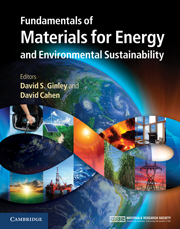Book contents
- Frontmatter
- Contents
- Contributors
- Preface
- Acknowledgments
- Part 1 Energy and the environment: the global landscape
- Part 2 Nonrenewable energy sources
- 9 Petroleum and natural gas
- 10 Advancing coal conversion technologies: materials challenges
- 11 Oil shale and tar sands
- 12 Unconventional energy sources: gas hydrates
- 13 Nuclear energy: current and future schemes
- 14 Nuclear non-proliferation
- 15 Nuclear-waste management and disposal
- 16 Material requirements for controlled nuclear fusion
- Part 3 Renewable energy sources
- Part 4 Transportation
- Part 5 Energy efficiency
- Part 6 Energy storage, high-penetration renewables, and grid stabilization
- Summary
- Appendix A Thermodynamics
- Appendix B Electrochemistry
- Appendix C Units
- Index
- References
10 - Advancing coal conversion technologies: materials challenges
from Part 2 - Nonrenewable energy sources
Published online by Cambridge University Press: 05 June 2012
- Frontmatter
- Contents
- Contributors
- Preface
- Acknowledgments
- Part 1 Energy and the environment: the global landscape
- Part 2 Nonrenewable energy sources
- 9 Petroleum and natural gas
- 10 Advancing coal conversion technologies: materials challenges
- 11 Oil shale and tar sands
- 12 Unconventional energy sources: gas hydrates
- 13 Nuclear energy: current and future schemes
- 14 Nuclear non-proliferation
- 15 Nuclear-waste management and disposal
- 16 Material requirements for controlled nuclear fusion
- Part 3 Renewable energy sources
- Part 4 Transportation
- Part 5 Energy efficiency
- Part 6 Energy storage, high-penetration renewables, and grid stabilization
- Summary
- Appendix A Thermodynamics
- Appendix B Electrochemistry
- Appendix C Units
- Index
- References
Summary
Focus
The historic and current global energy portfolio is dominated by fossil fuels, an affordable and plentiful means of energizing the development of human civilization. The focus of this chapter is to give an overview introduction to coal and coal conversion processes, with a focus on the development of materials and strategies that promote the efficient use of coal in an environmentally friendly manner.
Synopsis
Coal is the altered remains of biomass, and can be considered a means of storing solar energy on very long time scales. Coal has been used for centuries as a means of an affordable and plentiful energy source, and in recent years has been exploited for these characteristics through two processes: the direct combustion of coal to produce heat and electricity though steam cycles; and the gasification process that produces a highly combustible gas or liquid fuels and chemicals through liquefaction processes.
- Type
- Chapter
- Information
- Publisher: Cambridge University PressPrint publication year: 2011



